There’s a lot of factors to consider when it comes to choosing between cloud storage and conventional in-house storage systems. In this blog, we’ll compare the two options and then break them down in a few different areas, discussing the pros and cons of each.
In-House Storage
Seen as the safer option by many small and medium businesses around the world, in-house storage tends to be (but isn’t always) the more expensive option for most businesses. It’s seen by some as the safer option, at least in some respects, as all of your data is stored ‘in house’ and data breaches are easier to contain than if they happen over the cloud. Physical, on-site security then becomes a concern, as well as the cost of upkeep and power, which can be substantial for larger businesses.
Cloud Storage
No longer the new kid on the block, Cloud storage has been rapidly adopted by businesses of all sizes and is a huge draw for those looking to save on physical space. Typical in-house storage almost always takes up plenty of space within your premises – you’ll likely have seen and/or heard the server rooms/floors in most office buildings. Cloud does away with any need for these setups and instead utilises the cloud providers’ data centres for physical hardware running costs and security.
One potential disadvantage to cloud storage is the reliance on a solid internet connection. If the internet drops on your side or the host’s side, you’re left unable to access most, if not all of your information until service returns. That being said, today’s connections are usually incredibly stable, and many cloud providers will offer a 100% uptime Service Level Agreement (SLA).
Pros & Cons
Cloud Storage Pros:
- Faster and easier setup
- Amount of storage can be altered at a moment’s notice
- Less (usually zero) physical space required
- You can regularly back up your data
- Generally cheaper, especially upfront (Monthly payments)
- Often the cheaper option for larger businesses and enterprises
- Usually, an offer of uptime guarantees for your peace of mind
Cons
- Any internet issues will mean a lack of information access
- Cloud storage costs can increase when increasing requirements
- Depending on the speed of recovery, any downtime could cost your business
- There will be ‘lifetime’ costs to keep cloud storage up and running
In-House Storage Pros:
- Does not rely on the internet to the extent that cloud storage does
- Gives the holder physical access to the storage
- Can be the more cost-effective option for small and medium-sized businesses
- No access by third parties as all data is held in-house
- You can, if lucky, go a long time without any extra costs
Cons:
- Much higher upfront costs
- Any drive failure means more storage will need to be purchased
- Requires far more physical space compared to cloud
- There are no guarantees for uptime, while cloud companies usually offer this
- More susceptible to data loss during a disaster situation
So, after all of that information, you may still be unsure whether cloud storage is something you want to make a switch too? Speak to a member of our team who can help you decide, and if it is, guide you through the entire process from start to finish. With Cloudrack, you can be set up with an affordable cloud storage solution.




